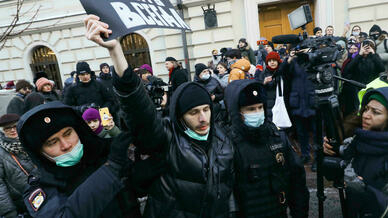At the request of prosecutors, Judge Mikhail Kazakov ordered the dismantling of Memorial’s Human Rights Centre, which fights against modern rights violations in Russia.
The country’s Supreme Court ordered the liquidation of Memorial International, the organization’s primary structure, on Tuesday. Memorial International commemorates Stalin-era purges and maintains the network’s massive archives in Moscow. US Secretary of State Antony Blinken and EU foreign policy leader Josep Borell blasted the decision, which comes at a time when Russia and NATO are already at odds over the Ukraine war. The judgments mark the end of an era in Russia’s post-Soviet democratisation movement, which began 30 years ago this month with the imprisonment of President Vladimir Putin’s chief opponent, Alexei Navalny.
- UN rights chief urges ‘de-escalation’ of Poland-Belarus crisis
- US Supreme Court appears prepared to roll back abortion rights
Prosecutors charged Memorial’s rights center with neglecting to put the “foreign agent” designation on its publications, which designates organizations that get financing from outside the country, as well as rationalizing terrorism and extremism. Several hundred supporters gathered in the frigid weather outside the courthouse. In 1989, Soviet dissidents, including Nobel Peace Prize laureate Andrei Sakharov, created Memorial, Russia’s most famous human rights organization. During the hearing on Wednesday, a prosecutor accused Memorial of “actively” assisting extremist groups and “foreign agent” organizations. The prosecutor said that Memorial was the one who infringed on Russians’ rights and freedoms, citing a lack of accounting openness as an example.
Political observers say that the charges of extremism and terrorism have been used by Russian authorities to punish Putin critics.Ahead of the ruling, Alexander Cherkasov, head of Memorial’s rights centre, said the closure would mean that political repression is a fact of life in the country.”For the past three decades, all our activities have been aimed at protecting the citizens of Russia and the interests of the Russian state,” he said in court.”If we are closed over this, it will confirm that the persecution of citizens for political reasons is one of the systemic factors of our life.”
Memorial “creates a misleading image of the USSR as a terrorist state and denigrates the legacy of World War II,” the prosecution noted on Tuesday. “The Kremlin’s decision to close Memorial is an outrage,” Human Rights Watch Executive Director Kenneth Roth said on Tuesday. “It speaks to the Russian government’s worries that the honest and impartial accounting of its activities that Memorial gives would no longer be tolerated,” he continued. “If looking in the mirror is too painful, the solution is to modify one’s behavior, not to break the glass.” Memorial International promised to file an appeal and seek “legal means” to continue its work.
“Memorial is not an organisation, it is not even a social movement,” it said. “Memorial is the need of the citizens of Russia to know the truth about its tragic past, about the fate of many millions of people. “Memorial’s rights centre has campaigned for the rights of political prisoners, migrants and other disadvantaged groups, and highlighted abuses, especially in the turbulent North Caucasus region that includes Chechnya. The centre has also compiled a list of political prisoners that includes Navalny and members of regional minorities outlawed in Russia including the Jehovah’s Witnesses. Putin has, however, accused the group of advocating for “terrorist and extremist organisations”.
The court ruling against Memorial International sparked an international backlash. “The people of Russia — and the memory of the millions who suffered from Soviet-era repression — deserve better,” said Blinken. Borrell tweeted: “Critical looks on their past are essential for the healthy development and progress of societies.”
“Even by the standards of 2021, the closure of Memorial is an extraordinary event. A monstrous one,” Meduza, an independent news website, said in an editorial.


